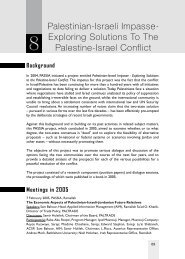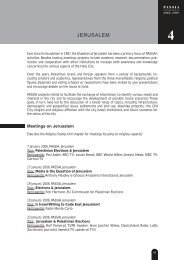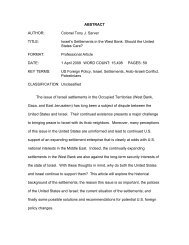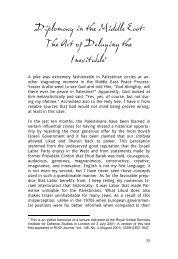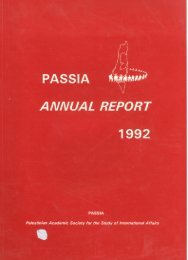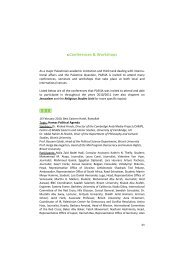FINLAND & PALESTINE Proceedings of a Joint Workshop
FINLAND & PALESTINE Proceedings of a Joint Workshop
FINLAND & PALESTINE Proceedings of a Joint Workshop
Create successful ePaper yourself
Turn your PDF publications into a flip-book with our unique Google optimized e-Paper software.
Development <strong>of</strong>the £V's Political Role<br />
_____________________.._.___.___•<br />
its disposal the kinds <strong>of</strong> instruments that individual countries<br />
lack - particularly the enlargement policy, and the European<br />
Neighborhood Policy Instrument. But, in addition to the fields<br />
<strong>of</strong> the EU's 'traditional strengths', the Union's Member States<br />
clearly want the Union to have a greater say in matters related<br />
to the foreign and security policy - and even defense policy.<br />
Such a desire is understandable, in view <strong>of</strong> the fact that there<br />
are strong links between economic, trade, development, political,<br />
and security matters in today's world.<br />
The EU, like any international actor, seeks to ensure that any<br />
significant development, or change, is positive/progressive.<br />
What can be considered progress, <strong>of</strong> course, has to do with the<br />
interests and values <strong>of</strong> the one making the assessment. When<br />
it comes to the EU, the central values <strong>of</strong>ten referred to are<br />
democracy, rule <strong>of</strong> law, separation <strong>of</strong> powers, respect for human<br />
rights, equality, and social security, among others.<br />
However, the EU's foreign policy actorness should not be seen<br />
only in terms <strong>of</strong> the values and interests <strong>of</strong> the Union and its<br />
Member States, but, also, as concerns the institutional identity<br />
formation. Identity is the ground from which both values and<br />
interests arise. The EU is still a project-in-the-making, and<br />
there have been various prospects for the direction, and final<br />
form, <strong>of</strong> the European integration. 2<br />
The decisions the EU takes to act usually reflect the various purposes<br />
<strong>of</strong> the EU's actorness in circumstances that encourage or<br />
provoke the Union to act. Purposeful action is always about the<br />
ways in which the existing realities may be changed. In pragmatic<br />
judgement, action that has no practical consequences is meaningless.<br />
The purposes are not exclusive, <strong>of</strong> course, but motivat<br />
2 See e.g. Adler (1997); Peterson and Sjursen (eds, 1998); laidi (ed. 2008);<br />
Wiener and Diez (eds, 2004).<br />
68



